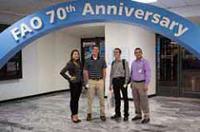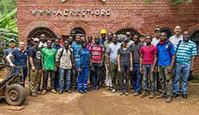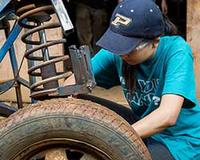IE undergrad: From Purdue to Cameroon and Italy
In May 2015 she participated in the Purdue Utility Project’s (PUP) annual trip to Bamboutos, Cameroon. While there, she and fellow team members trained Cameroonian interns and implemented improved PUP designs they had developed at Purdue.
Five months later she attended the United Nations Planet Forward Storyfest 2015 in Rome, Italy, with the winning PUP project team. Yuan and three other Purdue students presented the PUP project to world agricultural policy makers at the United Nations Food and Agricultural Organization’s (UNFAO) Committee on World Food Security, held October 11-15.
The multi-disciplinary Purdue team included two undergraduate students, Yuan of Industrial Engineering (IE) and Josh Greenstein of Mechanical Engineering (ME), and two graduate students, David Wilson and Jeremy Robison, both from Agricultural and Biological Engineering (ABE). Theirs was one of two winning teams, chosen in part because of their 3-1/2-minute video about the PUP project. Faculty advisor John Lumkes (ABE) also attended.
“Because our video won, the whole team was invited to the UN to come present our project,” said Yuan. The team served on several panels and talked about how feasible the PUP might be to produce in other countries.
Yuan appreciated the global, multi-disciplinary mindset she found at UNFAO. “I realized that to ‘push the planet forward’, if you will, it requires the youth of all majors, all disciplines, to get together and work towards a common goal using what they have been taught,” she said.
She believes that IEs have a lot to offer projects like the PUP. “I think because IEs are more business-oriented I kind of saw myself as…a bridge between the policy-makers and then my fellow engineers who were also there,” explained Yuan. “Although it’s relatively new compared to the classical mechanical and electrical engineering, people are starting to notice the benefits of having [industrial] engineers who are also proficient in communicating and business.”
Yuan is currently the sole IE student on the PUP team, but Lumkes would like to see more IE students participate. “There are many opportunities for IE students to get involved and impact the project, specifically in the areas of manufacturability, supply chain logistics, and ergonomics,” he said.
Yuan first learned about the PUP project and other Global Design Team projects in a freshman Humanitarian Engineering class. She was drawn to the other students' passion and involvement in empowering communities to better their lifestyles through engineering projects. She also liked the fact that the PUP team is multidisciplinary, bringing together students and faculty from many engineering disciplines.
While in Cameroon, Yuan "was in charge of buying the angle iron and cutting it, and then all the woodwork". Back at Purdue, where the team meets on Monday nights to work on the design, she researches scalability issues such as ordering parts for PUP mass production in Cameroon, transportation costs for the parts, and optimum amounts to manufacture to save money.
The PUP is a part of the Purdue Utility Project Global Design Team. It is a multi-purpose utility vehicle that can be built with local materials and tools found in rural Africa, thus saving money and enabling easier maintenance. The three-wheeled tractor/truck/taxi’s primary power source - typically a small 6-7kW single cylinder diesel engine - can also be used to power a variety of implements like water pumps, maize grinders and electrical generators. Lumkes partners with the African Centre for Renewable Energy and Sustainable Technology (ACREST) in Cameroon, where he has taken Purdue teams yearly since 2009.
"I think IE students can consider...participating in more humanitarian opportunities," reflected Yuan. "Now even though humanitarian opportunities might not be trying to make a profit, the end goal is to make a humanitarian opportunity more efficient and to help more people, and I think that's a better cause than making a profit."
The PUP is sponsored by the Purdue Global Engineering Program, Department of Agricultural & Biological Engineering, International Programs in Agriculture, the Office of Engagement, the John Deere Foundation, and BS SolidWorks.
The PUP video that sent these Boilermakers to Rome: https://www.youtube.com/watch?v=7JMmN15vMOo
The PUP project: https://engineering.purdue.edu/pup/
Purdue Global Design Teams: https://engineering.purdue.edu/GEP/Programs/GDT
The UNFAO Storyfest:
http://www.planetforward.org/2015/11/02/blog-storytelling-and-the-pup-in-rome
https://www.youtube.com/watch?v=ALMMdQ-AG_k
Writer: DeEtte Starr, starrd@purdue.edu
Source: Pamela Yuan, ABE Associate Professor John Lumkes, lumkes@purdue.edu
Photos courtesy of Pamela Yuan, John Lumkes, and the PUP project.





